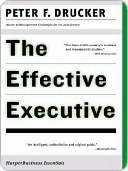To be effective, every knowledge worker, and especially every executive, therefore needs to be able to dispose of time in fairly large chunks. To have small dribs and drabs of time at his disposal will not be sufficient even if the total is an impressive number of hours.
Several pieces support this:
1. Cleese creativity video: Need about 90 minute chunks of time; the first 30 minutes or so are spent settling down and idly playing with the problem; don't expect results. Sometimes nothing happens (not even a sausage); Don't stop after the first "good" answer you come up with.
2. Agile/psychology/etc.: Rapid task-switching is a sure-fire way to burn up time and energy but produce very little. There are definite, measurable penalties to be paid for task switching.
3. Maybe this is why 80% of Tim Ferriss podcast interviewees practice some form of meditation. It gets you conditioned to just sit with things, concentrate, and ride them out. Catch your mind wandering, which is really a form of task switching/self-distraction. Gently but firmly pulling your attention back to where you want it to be, but without any self-judgement etc.
See also essay on "maker vs manager" schedule. Large chunks of time (maker) vs 0.5–1 h slots (manager).


